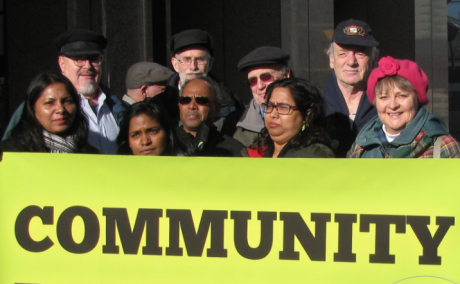Columns
You are here
Toronto Community Benefits Network wins green jobs

December 19, 2016
In 2008 during financial crisis, which saw the loss of hundreds of thousands of manufacturing jobs in Canada and Quebec, an organization was founded in Toronto: the Good Jobs for All Coalition (GJFA). It held a founding conference attended by over 1,000 trade unionists, environmentalist and members of the diverse communities which make up the city. Those present developed a shared vision of creating a new economy with good, green jobs for all. They came together recognizing that we were faced with an economic crisis, an environmental crisis and a crisis of equity in our society, and that we needed to build the unity necessary to overcome all three. It’s a labour-community coalition which has made its mark on the city.
Strong relationships were built over the last eight years and one of the accomplishments was the founding of the Toronto Community Benefits Network whose role was to ensure that the diversity of Toronto was fully represented in the massive investment in infrastructure that was taking place. Mass transit is a key part of building a green economy and pressure has been put on all levels of government to provide the resources to allow for significant expansion which will reduce the dependence on cars. This means jobs, good union jobs but it was a question of who was getting them.
Outreach was done in the effected communities that the transit growth was impacting. Untold meetings took place with local residents and a priority of providing good, green jobs for racialized youths was decided upon. Years of negotiations took place with community pressure on both the provincial government and Metrolinx, the agency that was overseeing the expansion. A three year study was done by the GJFA with academics at a local university which determined that green jobs were not going to racialized communities and it was imperative that this change.
A Community Framework was agreed on with Metrolinx in 2014 but there were no guarantees. Pressure continued and the TCBN wanted a minimum of 10 per cent of the hours on the Crosstown line to be done by workers from historically disadvantaged communities and equity seeking groups. Unions in the building trades came on board and after long negotiations an apprenticeship plan was agreed to with the consortium that was building the project, Crosslinx Transit Solutions. Interestingly the jobs include those in administrative and technical areas, not only construction.
After a long battle the Metrolinx board affirmed their commitment on not just the Eglinton Crosstown but on all future transit builds, which is a huge breakthrough. The provincial government in a declaration signed by Metrolinx, the contractor, and others including the Toronto Community Benefits Network agreed to a program of training and hiring workers from the above mentioned groups. The idea is to have apprentices and journypersons from these groups in long term, skilled, union, climate jobs. This would never have happened if labour and community did not come together and fight for green jobs for those who were historically excluded.
In a city like Toronto the environmental movement must make a priority of working with unions and racialized communities to work for climate jobs for all. In order to build a broad based movement for change it has to put the needs of working people in all our diversity first in organizing for climate justice, and push back against the corporate elites who are trampling on the rights of the Chippewas of the Thames, the Standing Rock Sioux, racialized youth and laid off tar sands workers. The corporations care nothing for the needs of the environment nor the needs of workers, Indigenous peoples or community members. Recognizing this and fighting for equity has to fully integrate into our struggle for change.
Section:









